TABLE OF CONTENTS
We live in some truly uncertain times — times in which most people have less disposable income, be it for bare necessities or frivolous spending. And so, naturally, we’re all looking to save a few dollars or euros, to find a good deal, and use those saved funds elsewhere.
When there’s so much chaos around us, it’s less about buying the latest and greatest piece of tech, and more about being prudent and frugal. And so, naturally, one cannot help but wonder: does buying a used laptop make sense? Is it safe and, if not, why not?
No matter where you are in the world, you almost surely have access to an online marketplace of some kind, one which is packed with second-hand goods, including laptops, mobile phones, tablets, computers, and such like.
Laptops are seldom cheap, and that’s especially true for good ones — those with bright, color-accurate displays, top-notch build quality, a versatile port selection, and input devices that are a joy to use and interface with.
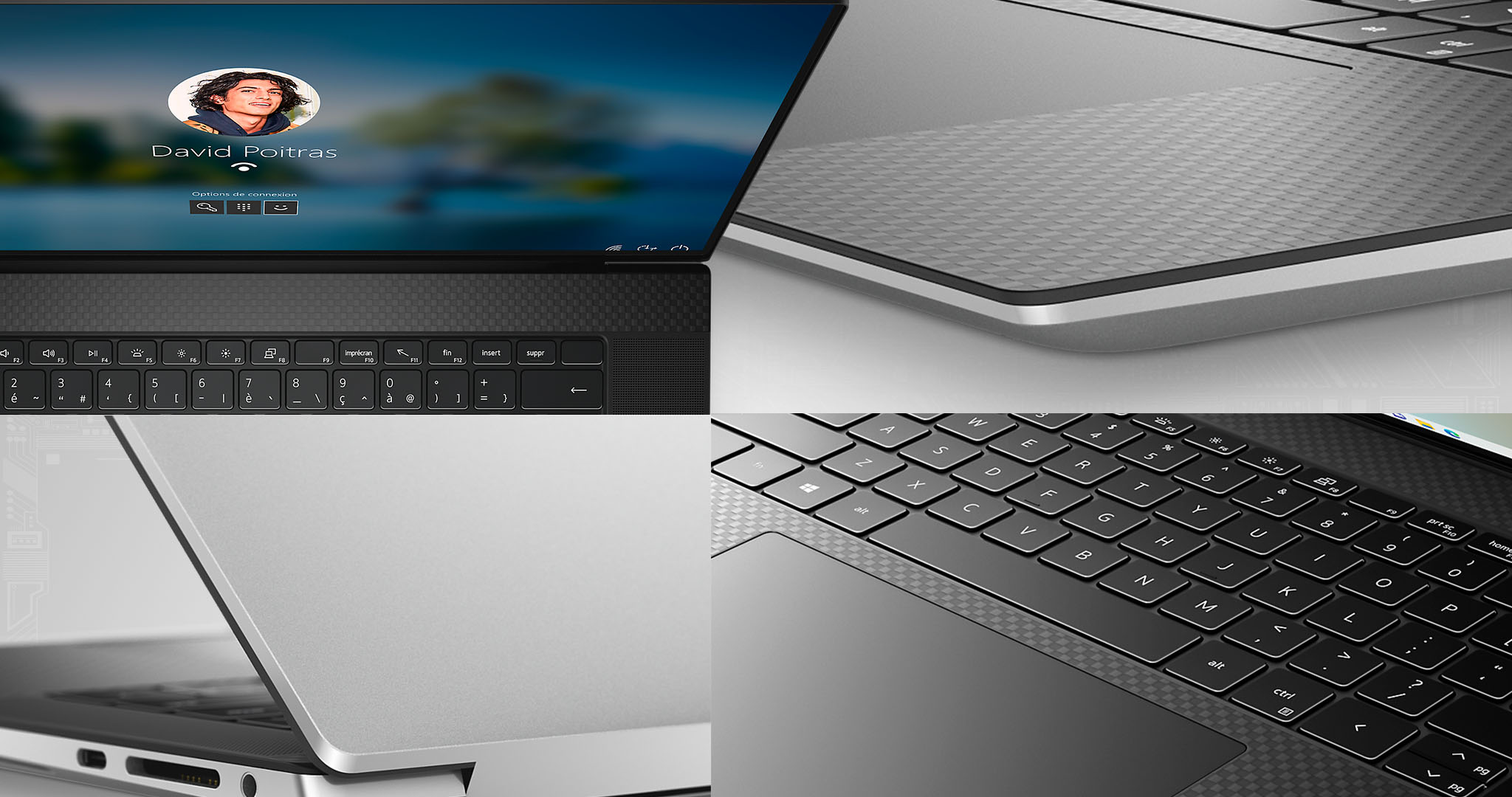
Image Credit: Dell
So why not save a few hundred dollars or euros, if the machine itself is still in pristine condition?
Well, there are many potential pitfalls and problems you might encounter, so it’s not exactly as straightforward an endeavor as one would hope.
At best, you could very well end up with a laptop that’ll serve you for the years to come and not exhibit any issues whatsoever. At worst, you could end up getting conned.
The potential of dealing with a fraudulent seller is an ever-present risk, so it’s easy to understand why so many people tend to gravitate towards buying new as opposed to used.
And so, with all of that being said, let’s go over a few crucial things you need to keep in mind if you’re in the market for a used laptop.
Is It OK to Buy Used Laptops?
It is, but you do need to be extremely cautious.
Used laptops, believe it or not, come from various different sources, and the way in which they are used varies as well.
Some of them were only used for a while and are now being sold because, say, the original owner prefers a different form factor, spec sheet, or operating system. Others, however, could have very well been transported/smuggled from a different country.
Let’s go over a few potential scenarios when it comes to the origin of used laptops:
Used laptops sold by their original owners
This is what you’re after, essentially. In this case, you’re buying straight from the original owner, who might be selling the laptop for a myriad of different reasons.
Maybe they prefer a larger screen or a different kind of panel. Maybe they need a bit more horsepower or, say, would like a higher level of craftsmanship and build quality.
There are many different reasons why one would want to sell one’s laptop and go with a different model.
If possible, try to search for laptops that were used for about a year if not less. These machines will exhibit the least amount of wear and tear and will, for the most part, be in (near) pristine condition.
They’ll also, depending on the model, still have their warranties, which is also a nice benefit for additional peace of mind.
Laptops that were repaired and/or smuggled
This is where things get a bit murky. Laptops that were smuggled from a different country are a pretty frequent occurrence.
This obviously varies from one region to the next, but the point stands nonetheless. Eastern European countries, for instance, are flooded with used and refurbished laptops from Sweden and Germany.
Some of them were bought from large businesses and corporations, others from schools, and others still from certified repair shops.
One seldom finds out where exactly these laptops came from, which makes purchasing them a somewhat perilous endeavor. They’re rarely stolen, but you can never be too certain whether anything was ever replaced.
A mixed bag, if you will. If the source (or seller, rather) is trusted and well-reviewed, then it might be an option worth exploring. That being said, make sure to read our tips for buying used laptops, all of which are written down below.
Refurbished laptops
Refurbished laptops have a bad rap which, for the most part, is pretty unwarranted. Buying a refurbished laptop, one could argue, is an even better idea than buying a used one.
They exhibit little to no discernible signs of use, are often covered with warranties (depending on the source/retailer), and can be bought for a lot less money than one would expect.
Buying factory refurbished laptops straight from OEMs like Apple, Lenovo, or Dell (just to name a few) is always the best possible route.
Amazon, eBay and Best Buy are also worth exploring because of their incredibly lenient return policies and respectably long warranties.
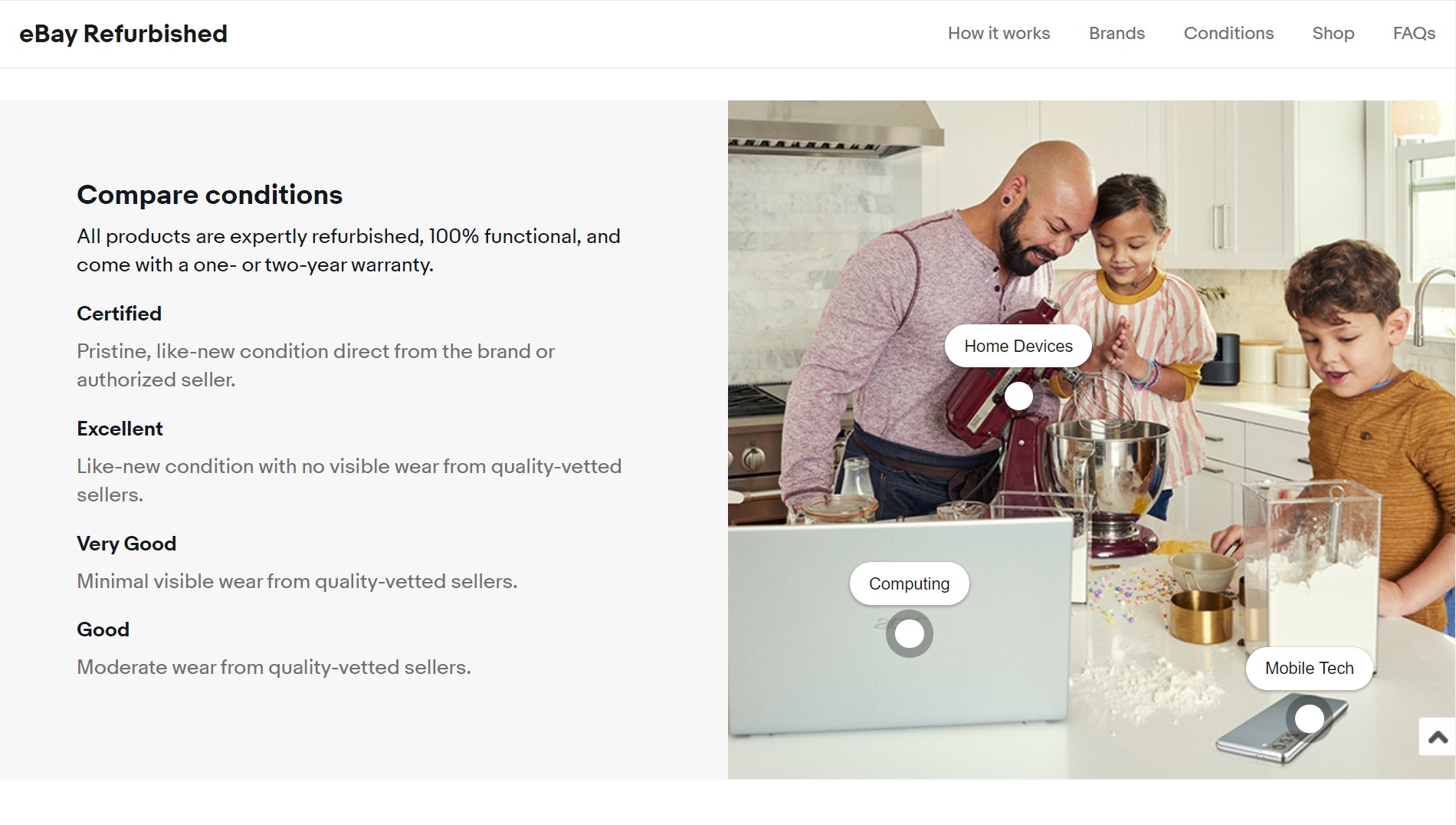
Source: eBay
Laptops that were used by businesses and corporations
Larger corporations tend to buy (or lease) laptops in bulk for their employees. These, for the most part, are Lenovo ThinkPads and equivalent offerings from other OEMs like HP and Dell.
These laptops are mostly used for general productivity work, typing out Excel sheets, emails, and content consumption. Some employees take their laptops home and use them as their primary computing devices, whereas others leave them in their offices and then resume work early in the morning.
Once two, three, or four years go by, these companies collect said laptops, sell them and then buy newer, refreshed models for their employees.
To whom they sell it varies. In some countries, these things are regulated. In others, they are not. And so, depending on where you are in the world, you might find your local second-hand market flooded with Lenovo ThinkPads and comparable business models from competing OEMs.
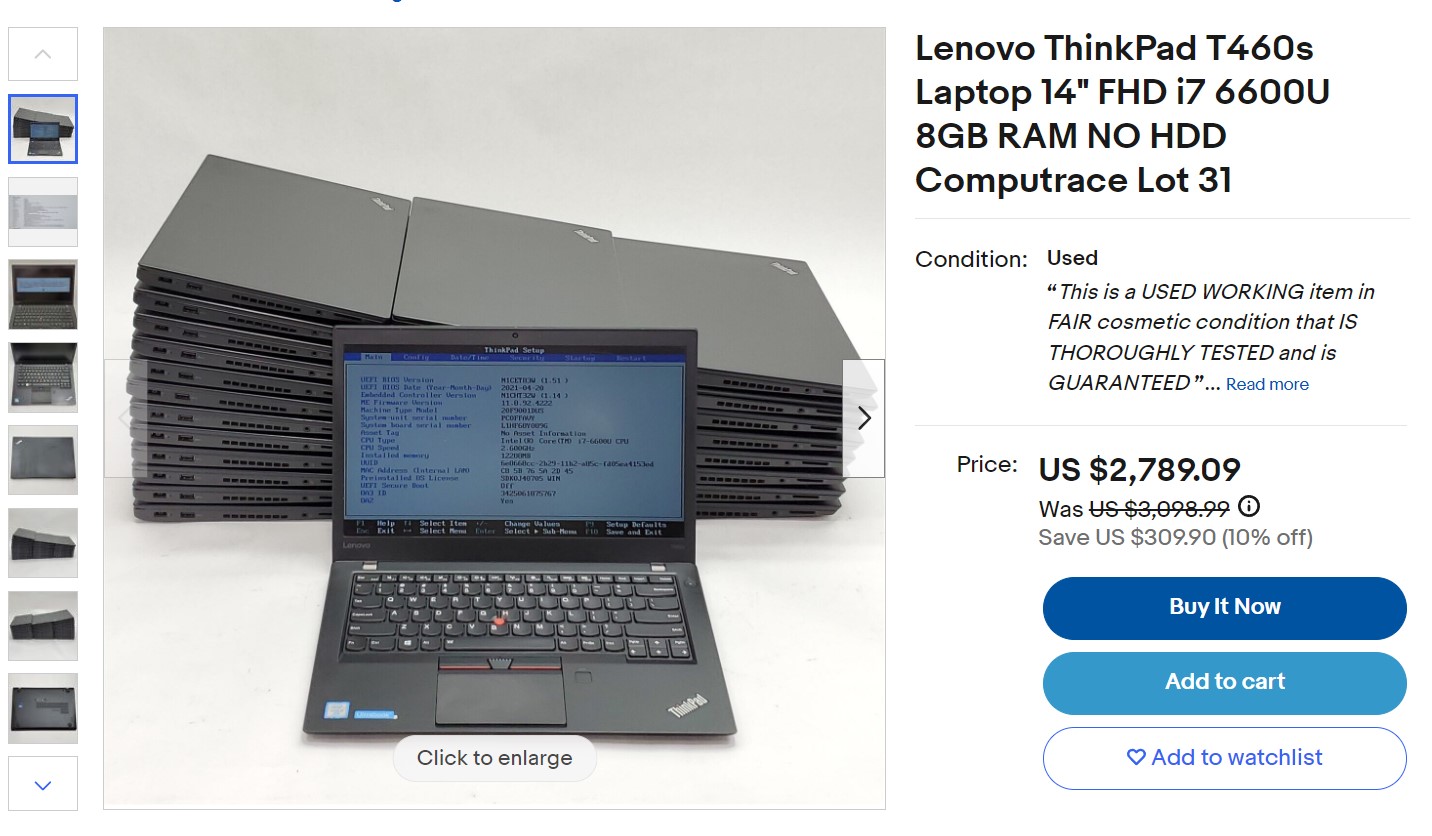
Source: eBay
These laptops are, for the most part, safe picks as they most likely haven’t been subdued to any strenuous tasks.
They’re also well-built and are expected to last for many a year. And, last but certainly not least, they haven’t been stolen or smuggled from who knows where.
Which Used Laptops Should You Buy?
There are many different kinds of laptops. Some are geared towards business people, others towards light productivity work and content consumption.
Others still are packed with the latest and greatest internals money can buy and are designed to deliver an incredible level of performance in both creative workloads and gaming.
So, which should you go for?
Should You Buy Used Gaming Laptops?
We’d generally advise against buying used gaming laptops.
Most of them aren’t all that impressively cooled which means they run hot and loud even when they’re brand new. Moreover, most gamers don’t really take great care of their devices.
Additionally, the way in which people game varies wildly. Some only queue up for an hour or two after work before jumping into bed and calling it a day.
Others game for six, seven, or even eight hours a day. You’re after a laptop that hasn’t been used and abused all that much, and the gamer crowd, while certainly passionate, isn’t known for moderation.
It’s a cliche, sure, but it exists for a reason.
Should You Buy Used Creator Laptops?
That’s heavily up for debate. If it’s a creator laptop geared towards graphic design, photo editing or, say, some light video editing, then it might be a good idea.
If it’s a spec’d-out behemoth with all the latest and greatest bells and whistles, then you might want to exercise a bit of caution.
People, in general, use their laptops in a myriad of different ways, and creator laptops, in particular, are designed to withstand a fair bit of “abuse” — for the purposes of one’s profession, of course.
Prolonged rendering can leave a heavy toll on a laptop, especially if it isn’t appropriately cooled. Moreover, the price delta between a used and new creator laptop often isn’t all that large, so it’s best not to risk it.
Should You Buy Used Business Laptops?
Absolutely. Those laptops are, for the most part, built to last; they’re extremely sturdy and durable, and often don’t get as hot as those that are imbued with more powerful H/HS series processors and dedicated graphics cards.
Their processors mostly come with a TDP of 15-28W and just a single fan — there aren’t many moving parts and their temperatures are often kept in check.
This obviously varies from one OEM and product generation to the next, but the point stands nonetheless. This, amongst many other things, makes used business laptops a worthwhile investment.
Should You Buy Used Entry or Mid-Range Laptops?
Do not, under any circumstance, spend your money on a used entry-level or mid-tier laptop.
Those devices are underpowered, they feature dreadful displays, awful build quality, and are not built or designed to stand the test of time. They are ill-advised purchases almost by default.
Instead, go with an older but higher-end model — one that can now be acquired for a much more palatable sum of money.
You’re looking to save a few hundred dollars and, in doing so, possibly accept a few cut corners, but you should still be able to get a stellar deal and a laptop that’ll deliver the kind of performance you’re after.
Tips for Buying Used Laptops
If you’re in the market for a used laptop, here’s a list of things you need to keep in mind before making any kind of investment:
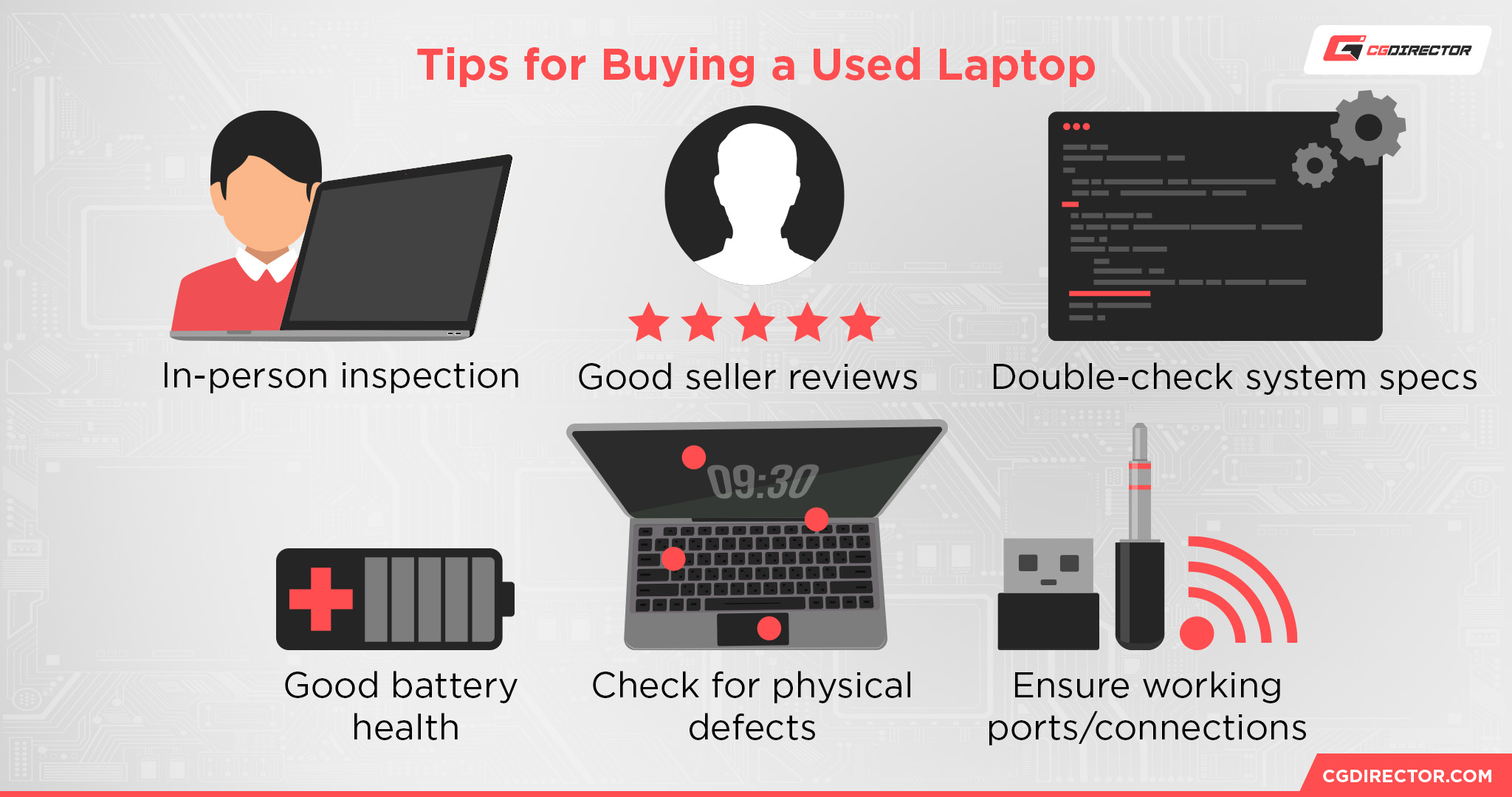
- Buy the laptop in person — If the seller is offering to send you the laptop via post without you first inspecting it, it might be a scam or, at best, the seller might be trying to hide something. The laptop is probably in working condition, but one of its ports might be dead or, say, its hinge might be a bit too loose. The possibilities are endless. Maybe it’s been tinkered with and repaired — something you can’t really tell from low-res photographs on eBay or wherever else. Those who have nothing to hide will always accept to meet up in person and have you test everything out to your heart’s content.
- If it looks too good to be true, it probably is — The internet, as a whole, is littered with scammers and frauds. If you come across a deal that seems too alluring, it’s probably a sham.
- Inspect the seller’s profile and check previous reviews — Get “acquainted” with the person you’re buying from. See if they have any negative reviews and, if possible, even read the positive ones as well, as previous buyers might have left a few tidbits worth knowing.
- Ask the seller about the origin of the laptop — You won’t always get a straight answer, but if the seller isn’t willing to talk about the history and overall “origin” of the device, then that probably means you ought to look elsewhere.
- Arm yourself with a USB stick, some headphones, and a Wi-Fi hotspot — Test out each and every single port. Also, if possible, use your phone as a mobile hotspot and check whether the laptop connects to it. It might sound crazy, but you’d be surprised by the sheer amount of junk people are trying to peddle online.
- Double-check the spec sheet — You really ought to double-check whether the laptop you’re buying has as much RAM and storage as the seller is claiming. For Windows 11, simply go to Settings > System > About. For Windows 10, you can do any of the following. If you’re in need of a more detailed breakdown, press on the Windows key and search for System Information. You can do so by simply typing msinfo and the appropriate application will immediately pop up as a search result.

Source: GroovyPost
- Play a video/song to make sure the speakers work properly (and exhibit no crackling sounds)
- Check the number of battery cycles — Batteries degrade over time. The more cycles it has, the sooner it’ll have to be replaced. This number, in other words, will affect its endurance. To check how many cycles it has, you can employ the battery report method.
- Check the display for dead pixels and backlight bleed
- Do some stress testing, if you have any concerns
- Check if its BIOS is locked — This one’s important. If it’s locked, the laptop might have been stolen. Or, alternatively, it might have been acquired by a seller who bought a bunch of laptops in bulk through entirely legal means but didn’t expect their BIOSes to be locked. Either way, it’s a hassle that might not be worth dealing with.
- Test the keyboard and trackpad (thoroughly)
- Be mindful of the hinge — You do not want to hear even the slightest bit of creaking. A loose hinge is perhaps even worse, so make sure to open and close the laptop multiple times, just to be sure that everything’s in order.
Tips for Buying Used MacBooks
All tips mentioned above hold true for MacBooks as well, but you also need to check whether it’s locked to an existing iCloud account. If it is, it has most likely been stolen.
If that’s the case, you won’t be able to use it at all. And so, if you’re looking to buy a used MacBook, meet up in person with the seller (if possible), and then, during set up, connect it to your own iCloud account, just to be safe.
Sometimes the original owner simply forgets to remove their Apple account from the device. It happens, and while it’s by no means rocket science, the process itself can get a bit confusing, especially for those who aren’t particularly tech-savvy.
Apple’s refurbished laptops are also worth exploring, even though they’re never quite as cheap as used one.
How Long Do Used Laptops Last?
There are never any guarantees, sadly. Heck, that holds true for brand new laptops as well. It also depends on the model.
If it’s a business laptop, one with incredible build quality and adequate cooling, then it’s probably going to last for longer than you’d expect — three, four, five years.
If it’s a cheaper laptop with a plastic enclosure, then something is bound to give in sooner rather than later; the hinge, perhaps, or the trackpad. You get the point.
Used MacBooks are, generally, your best bet, alongside business laptops like Lenovo ThinkPads, HP EliteBooks, and such like. These laptops are built to last, and even if they were used for a couple of years they will most likely keep on truckin’ without ever exhibiting any kind of issue or defect.
Moreover, if you’re especially careful and want your laptop to last as long as possible, try to go with a model that doesn’t have a dedicated graphics card.
That’s yet another potential point of failure and a component that, more often than not, tends to malfunction first a few years into ownership — in no small part due to insufficient cooling and dust and debris accumulating over time.
You should also avoid buying a laptop that has a mechanical hard drive. We cannot stress that enough.
Should You Buy Used or Refurbished Laptops?
Refurbished laptops are a much better pick overall, especially if they’re bought from reputable sources and retailers.
In most cases, they’re covered with some kind of warranty, they can easily be returned within a pre-defined time frame — in case you stumble across any issue or flaw — and are often in pristine condition.
Factory refurbished laptops, in particular, are your best and safest bet. Most OEMs have a dedicated page for refurbished products on their websites.
Amazon, Best Buy, and eBay also warrant a mention — just make sure to avoid any “seller refurbished” devices. Those, in short, should be avoided as if they were the plague.
Conclusion
Buying a used laptop is a challenging endeavor. There’s really no other way to put it.
You might face a myriad of different hurdles and pitfalls or, conversely, none at all. It all boils down to the “luck of the draw” and, frankly, a bit of common sense.
You should only buy from reputable sources and sellers (i.e. those with a ton of positive reviews), and only after first inspecting the laptop in person.
There’s this misconception that just because a laptop’s being sold online something must be wrong with it. That, in short, simply isn’t true.
People’s needs and preferences change — hence the reason why there are so many used laptops on the second-hand market.
With a bit of luck (and an abundance of caution), you can, by all means, end up with a “gem” that’ll serve you for the years to come.
FAQ
Let’s go over a few potential questions you might have regarding this particular topic:
Is It Safe Buying a Used Laptop?
For the most part.
It’s not the safest thing imaginable as there’s a myriad of different ways in which one can get scammed, but if you find a good, trusted seller (one with many positive reviews), and take as many precautions as possible, then there’s a very good chance and likelihood that you’ll end up with a used laptop that’ll both perform and look as if it were brand new.
Shady-looking deals and unverified sellers should be avoided at all costs.
You should also give factory/certified refurbished laptops a look as they’re a slightly safer option (and may well be even cheaper than used ones, depending on the particular model).
Are Used MacBooks Worth It?
Without a shadow of a doubt. Apple’s MacBooks are built to last and are, as such, amongst the finest laptops money can buy.
The only thing you might need to replace, depending on the model and its “age,” would be the battery.
You should, however, avoid buying a MacBook that has the oft-lambasted butterfly keyboard as they’re prone to malfunctioning — an understatement if ever there was one.
Which Used Laptops Should I Buy?
You should, if possible, prioritize business laptops: Lenovo ThinkPads, HP EliteBooks, Dell Latitudes, and the like.
Those laptops are exceptionally well-built and durable, and they can also be upgraded and repaired with ease. They’re amazing devices, all things considered, and have stood the test of time for a very good reason.
Over to You
Have you ever bought a used laptop and, if so, what was that experience like? Did it ever malfunction in any which way? Let us know in the comment section down below and, in case you need any help, head over to our forum and ask away!
![Is Buying a Used Laptop a Good Idea? [2024 Update] Is Buying a Used Laptop a Good Idea? [2024 Update]](https://www.cgdirector.com/wp-content/uploads/media/2023/10/Is-Buying-a-Used-Laptop-a-Good-Idea-Twitter-1200x675.jpg)
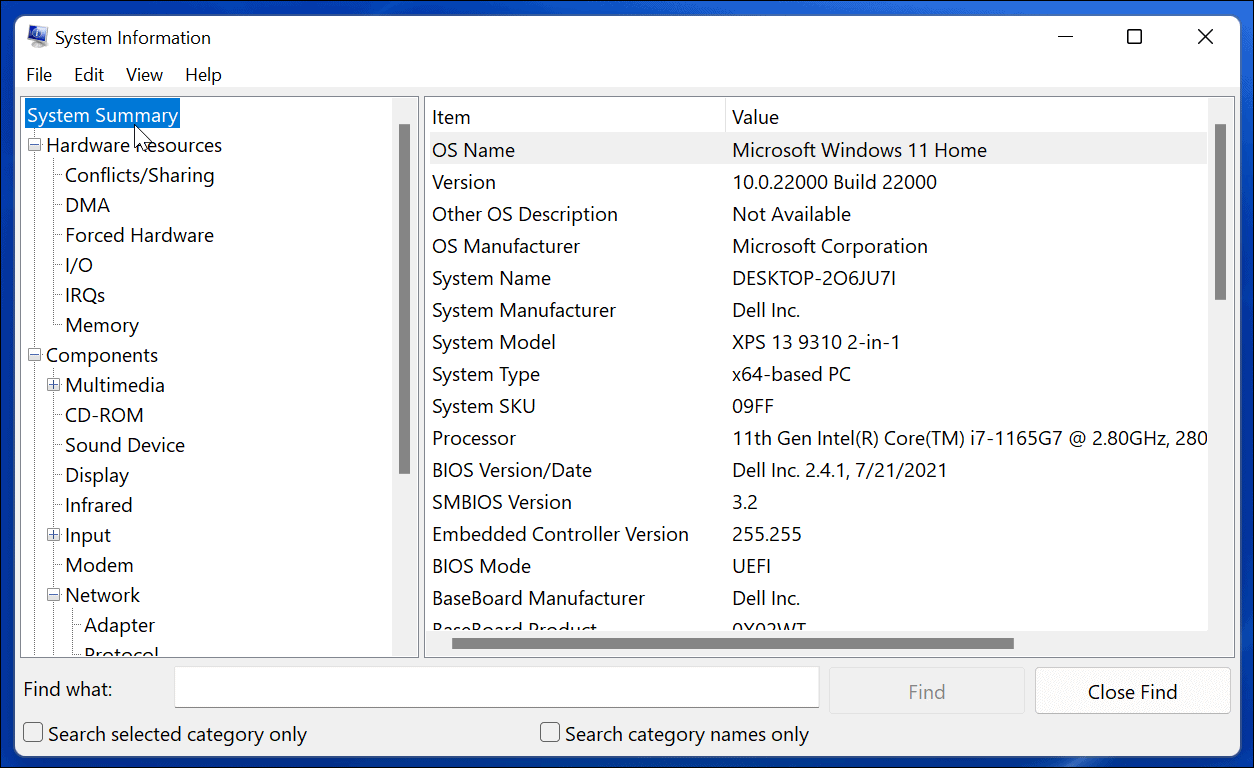
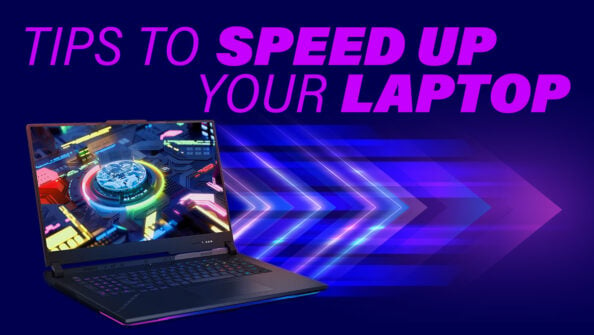
![Laptop Displays — Panel Types compared [IPS/OLED/TN] Laptop Displays — Panel Types compared [IPS/OLED/TN]](https://www.cgdirector.com/wp-content/uploads/media/2024/03/Laptop-Displays-—-Which-Panel-Technology-Should-You-Go-With-Twitter-594x335.jpg)
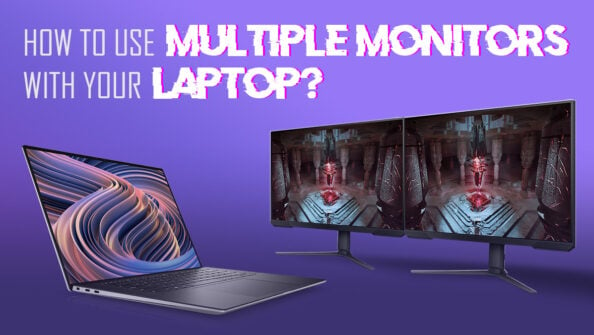
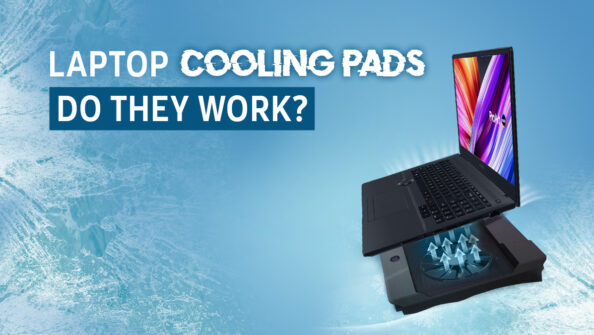

0 Comments